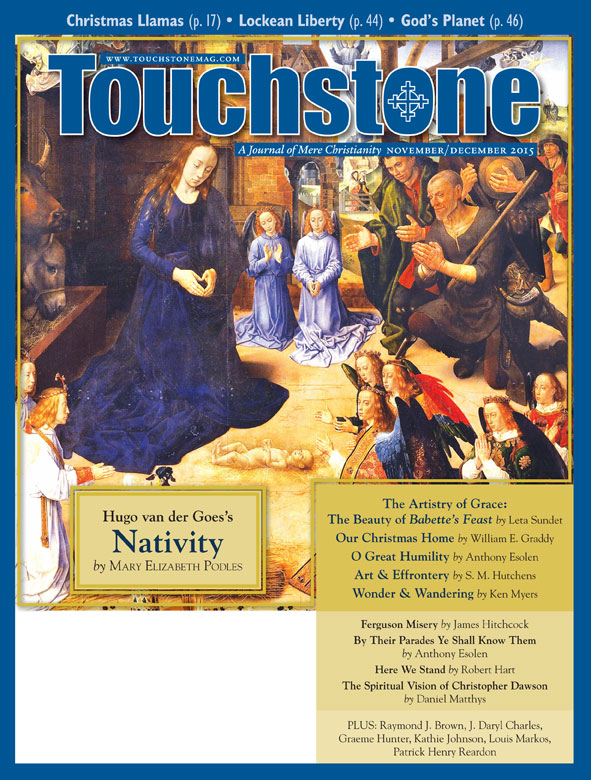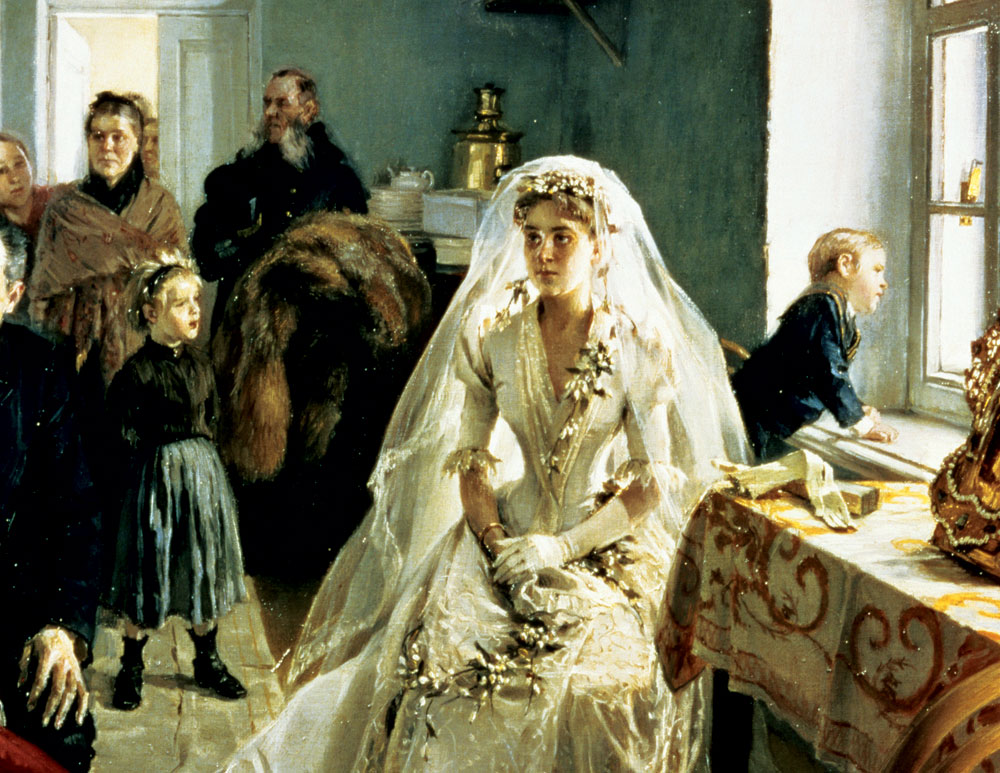Feature
By Their Parades Ye Shall Know Them
The Gods & Worship of Athens, Rome & Toronto
by Anthony Esolen
Back in the year 415 B.C., the Greeks of Athens woke one day to find that their sacred herms had been vandalized. A herm was an odd thing, a small statue essentially made up of a bust of the god Hermes and a protruding phallus. The god was portrayed with a beard, not as the beardless youth of the Olympian pantheon. That suggests that the religious impulse behind these statues—used for milestones and boundary markers—came ultimately from the very ancient fertility religion that the Olympians had in part replaced. The connection is obvious enough. The phallus is for fertility. When the god has intercourse with the earth, mother of grain and fruit, it must needs be fertile, bringing the harvest without which the worshipers would die.
But some drunken revelers had roamed about Athens and the neighboring villages and knocked the protrusions off the gods, a shocking sacrilege. The blame was laid upon Alcibiades, amoral, narcissistic, and brilliant. The Athenians could not prove that he had been the instigator, but because of their suspicions they made a decision that proved fatal to the city and her empire. Athens was in the middle of her long struggle with the Spartans. Alcibiades had persuaded the Athenians to mount a naval attack on faraway Sicily, friendly to Sparta. What they hoped to gain by this, other than glory, is not clear. The staid and rational general Nicias argued stubbornly against it, but in the heat of Athenian pride and passion he lost the day.
Now, the only man who could have pulled off that victory over Sicily was Alcibiades. But the Athenian assembly, heaping one bad decision upon another, relieved Alcibiades of command and gave charge of the expedition to Nicias. Alcibiades, out for revenge, soon sold his services to Sparta instead. Nicias was an intelligent and courageous soldier, but his very virtues here worked against him. Only a ruthless and reckless demagogue could have returned with victory, and Nicias was not that. The Athenian fleet was demolished.
The Athenians, of course, blamed Nicias and not themselves. Meanwhile, the Spartans took advantage of the turn of events, for the navy had always been Athens' greatest strength. Sicily led inevitably to the terrible coastal battle of Aegospotami, where the Spartans, astonishingly, crushed the remains of the Athenian naval power and imposed terms of surrender. That night there was wailing in Athens, because the people knew that their enemies would pay them back for the wicked things they had done when they were riding the high imperial wave. The gods delay; they do not forget.
The Athenian Festival
But Greek religion was not merely a spree of sex and nature worship. Quite the contrary. By their monuments and parades ye shall know them. Sculpted upon the pediment of the temple of Zeus at Olympia, and upon the metopes above the columns of the Parthenon in Athens, was the iconic battle between the Lapiths and the Centaurs. The Lapiths were men who had unadvisedly invited some Centaurs to a wedding feast. Everyone knows that a centaur is half man, half horse, but what we don't want to think of is that every man is half man, half centaur. The lower half of us is ever wont to rise up in rebellion against the upper half. The belly, allied with regions south, wants to have its way despite what the head advises. Indeed, the belly would corrupt reason, turning it into an instrument for procuring what the belly wants: food, drink, sex, bloodshed, and other delights.
So the centaurs are at the feast, they get drunk, which is no surprise, and try to rape the bride, which is a surprise but shouldn't be. The feast erupts into bloodshed. Which side was victorious? In a sense, neither. The god was victorious. The god Apollo, Olympian of light, of ordered song and intelligence and cunning, is portrayed at the center of the scene, descending to put an end to the violence, his arm extended in command. What does it mean? Man is the glory, jest, and riddle of the world, but he can—it is not certain that he will—so order his passions as to make him like the god. He can—it is not certain that he will—impose order upon the passions of a people, so that their city will resemble Olympus, and not a scene of lust and destruction.
That hope lay at the heart of the most famous of the Athenian festivals, in honor of the ambiguous god Dionysus, the god of wine and revelry, the god whom it is most unwise to belittle or ignore. The problem of civilization may be expressed thus: "What shall we do about Dionysus?" We find attempts at answering that question in the mighty plays of the tragedians Aeschylus, Sophocles, and Euripides. Will the house of Atreus continue in its coils of revenge, blood, and self-destruction, or can law and the straight judgment of impartial men return it to humanity? Must the suffering of Oedipus end in meaningless death, or is there something mysteriously redemptive in it, bringing a blessing to those who welcome the accursed man? Will the boy-ruler Pentheus learn to recognize that his supposedly dispassionate rationalism is a dangerous illusion—before he is torn to pieces in spirit and body both?
The Christian Jubilee
Let's leave Greece for a moment and turn to another paradigmatic feast. The year is 1300, and thousands of pilgrims have flocked to Rome for the jubilee declared by Pope Boniface VIII. They sing hymns. They make the rounds of the chief churches of Rome, not as tourists but as participants in a citywide liturgy. When they reach St. John Lateran, they climb the steps on their knees as they pray. They go to St. Mary Major and behold the glorious stories of the faith portrayed in red and blue and green and gold mosaic in the dome above the apse. They meet travelers from the Holy Land, palmieri in Italian, palmers in English, carrying branches such as were laid before Jesus as he rode into Jerusalem upon the colt of an ass, on the Sunday before he was crucified. Those travelers had put their lives on the line—such travel was never really safe, what with storm and plague and war. They walked the rugged path that Jesus walked up to the Skull Place, carrying his cross. They kissed the tomb where he was laid to rest, and whence he rose on the morning of the third day.
It is a celebration that embraces all of human existence, from the first Adam's fall in Eden to the second Adam's returning in glory. The worshipers are enfolded into a story filled with stories, of saints and sinners, of shame and holiness, of repentance and redemption. The city teems with the nations. The French pay honor to their patron St. Denis, and to the great bishop Martin of Tours, he who divided his cloak in half to clothe the nakedness of the beggar who was Christ himself. The Germans pay honor to St. Boniface, who preached to their pagan forebears that they had an inkling of the truth when they worshiped a tree—but the true Tree of Life they should honor was the Cross. St. Margaret of Scotland, St. Elizabeth of Hungary, St. Columbanus of Ireland, St. Anthony of Portugal, beloved by the Italians as one of their own; stories everywhere, heroes everywhere, men, women, kings, peasants, bishops, monks, scholars, common laborers.
All of those stories derive their significance from the one central Story, of the Word made flesh, who dwelt among us, who taught and healed and rebuked and consoled, who suffered at the hands of those he came to save, who for man's sake died a terrible death upon the Cross, who drove that Cross through the heart of sin, and stuffed the maw of death with death itself. "The Lord is risen," said the disciples then, and the people who celebrate repeat the words in their hearts, "He is risen indeed!"
The Peniles' Parade
And now we come to the present day. By their parades ye shall know them—so I say. We go to Toronto.
What god are the people worshiping?
If there are patriots in this parade, it is incidental; the parade is not meant to honor men who fought for their country. If there are tireless doctors in the parade, or excellent, self-denying teachers, or master craftsmen, that too is incidental. They are not the reason for the celebration.
We may specify what is certainly not there. We find no honor given to the great saving deeds of God. Jesus may be present at the parade, but only to be dragooned into it, or to be spat upon once again.
Is that a long cortege of elderly married couples, with their children and their children's children following them, smartly dressed, clean and reverent, celebrating forty or fifty years of fidelity? No, no such. Or is that a train of young married couples with their first children, infants in arms, giving thanks to God for new life? No, no such.
No virtues are celebrated. Not the cardinal virtues of temperance, wisdom, justice, and courage; much less the theological virtues of faith, hope, and charity. Do they march to honor their forefathers who carved a country from a land so far-flung, where only brave and determined labor could wrest a living from summers so short and winters so long? No, never. Their forefathers at best embarrass them. At worst, they are objects of scorn.
Why are they marching? What god do they worship?
Look first to the high priests. They are easy to spot. They are meant to be easy to spot. They are the "brave," the most aggressive in conquering new territories. To the crowds they are both unsettling and exciting—just the right confection of novelty and danger: mysterium tremendum et fascinans.
They are grown men, stark naked or nearly so, flaunting their wares to the cheering masses. Some wear leather and ply whips. Some get together to simulate unnatural sexual acts. Some carry obscene banners. They are couples, threesomes, foursomes. Some festoon their genitals with ribbons. Some of them are men dressed up as ghoulish women the world has never seen. Some are women dressed up as ghoulish boys the world has never seen. There's a lot of body piercing and tattooing—ears, lips, noses, chins, cheeks, breasts, nipples, navels, buttocks, testicles.
It won't do to say that I am only describing a part of this communal act of worship. It is the whole point of the parade that there should be such. They are the Gospel to the Methodist service, the Eucharist to the Catholic Mass. They are the fireworks. People line the streets not despite their appearance, but because of it, and bring their children too, for proper catechesis in the cult to which they all belong. It is the cult of the Penis: for the male worshipers, that they have one; and for the female worshipers, that they want one or pretend to have one. It is the organ that delivers meaning to
their lives.
Sure, a party of Anglicans can be found marching, with rainbows and big smiles. They are Peniles first, with the Anglican faith reduced to décor: Penile, Anglican style. There's a big group of Methodists: Peniles, Methodist style. The Roman Catholics are there too, but they do not look to Rome for their instruction. Rather, they look to the One Thang Needful: they are Peniles also, who say to Jesus, "Thus far, and no farther." Penile Conservatives march half-sheepishly along with Penile Liberals and Penile Greens. The devout sex is well represented. You will find plenty of Penile old biddies, prattling upon matters of profound Penile theology, such as when infidelity counts as infidelity, and how porn can be liberating after all.
You cannot startle or scandalize these worshipers. Every foray into the bizarre, the septic, the self-destructive, the perverse, is considered saintly, sacramental, salvific. Saints are odd birds, aren't they? They go where we would not go. Molokai, Calcutta; a porn shop, a market for teenage boys in Thailand, a swingers' camp—what's the difference?
You can tell the religion of a people also by what they will not compromise on, what they dare not subject to sacrilege. Everything must be subordinated to the established religion, to the tutelary god of the people. Which comes first, the Constitution or the Penis god? Parental oversight of how their children are taught in the schools? The liberty of Christian churches to serve the common good? The safety of teenage boys in the Scouts? Plain biological sanity? The truth about the derangement of our sexual appetites and all the harm we have caused to families and communities? Common decency? No, always the Penis god, first and last, twitching in approval. Sometimes they call him Love.
The Invisible Man
The ancient Greeks believed that man was a rational and social animal who could use his mind to see what was right and to move the passions of men to pursue it. Favored by the Muses, daughters of Zeus, the poet would sing or the orator would speak, and the enlightened people would follow his lead, looking upon him as a god. Christians believe that man is made in the image and likeness of God, made to seek his fulfillment in the love of his Maker and of his fellow man, perfected in the city called New Jerusalem. He is to look upon his brother and know that the Lord himself suffered and died for him, in an unfathomable love. He needs no government to confer dignity upon him, because "he who exalts himself will be humbled, and he who humbles himself will be exalted," sometimes exalted as high as Christ, crucified.
In the new religion, man dwells nowhere. Reason has been reduced to a calculator, or a pimp. There is none of the Greek conflict between loyalty to the clan and loyalty to the city, because cousins no longer know one another, even when there are cousins at all, and the city is but a geographical fiction. The herms were totems for fertility. The new man wants sterility instead. He sends no roots down into the richness of nature; he is a cultural and sexual tumbleweed. He has ancestors but no forefathers. He is intensively illiterate, able to read, and reading only the gaudy advertisements on garbage. He has no knowledge in his hands. A seller of cabbages and beans in medieval Chartres dwelt in the reflected gleam of tremendous beauty. The new man dwells in the glare of signs for all-night convenience stores. The peasant in medieval Uppsala heard the toll of bells from the cathedral a mile away, and knew it was time for prayer. The new man hears bad music and advertisements at the gas station.
He has no identity, except that which the Penis god bestows upon him. You are what you do in the bed or the bathhouse or the brothel. Your "sexuality" is the shirt and trousers and hat on an invisible man. That is why you cling to it so desperately, because without it you are not to be seen. You are an existential Oakland: there is no "there" within you. Hence also the terror when someone dares to question how you achieve your climax.
And so all the power of the state must be marshaled to protect people from non-existence. Even babies may be murdered, lest their progenitors disappear into reality. The few remaining heretics are "free" to believe in God, and nature, and the givenness of male and female. They are not free to be too public about it, because the whole social order, such as it is, rests upon the fragile identities conferred by the Penis god. Feminists themselves unwittingly testify to it, and fall down in worship when that god rises.
Anthony Esolen is Distinguished Professor of Humanities at Thales College and the author of over 30 books, including Real Music: A Guide to the Timeless Hymns of the Church (Tan, with a CD), Out of the Ashes: Rebuilding American Culture (Regnery), and The Hundredfold: Songs for the Lord (Ignatius). He has also translated Dante’s Divine Comedy (Random House) and, with his wife Debra, publishes the web magazine Word and Song (anthonyesolen.substack.com). He is a senior editor of Touchstone.
subscription options
Order
Print/Online Subscription

Get six issues (one year) of Touchstone PLUS full online access including pdf downloads for only $39.95. That's only $3.34 per month!
Order
Online Only
Subscription

Get a one-year full-access subscription to the Touchstone online archives for only $19.95. That's only $1.66 per month!
bulk subscriptions
Order Touchstone subscriptions in bulk and save $10 per sub! Each subscription includes 6 issues of Touchstone plus full online access to touchstonemag.com—including archives, videos, and pdf downloads of recent issues for only $29.95 each! Great for churches or study groups.
Transactions will be processed on a secure server.
more from the online archives
calling all readers
Please Donate
"There are magazines worth reading but few worth saving . . . Touchstone is just such a magazine."
—Alice von Hildebrand
"Here we do not concede one square millimeter of territory to falsehood, folly, contemporary sentimentality, or fashion. We speak the truth, and let God be our judge. . . . Touchstone is the one committedly Christian conservative journal."
—Anthony Esolen, Touchstone senior editor










